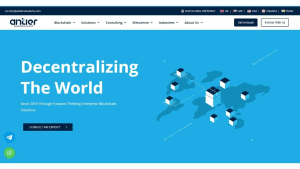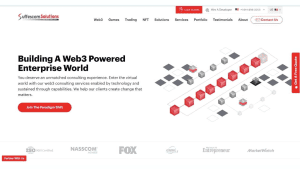List of Web3 Wallet Development Company
Types of Web3 Wallets
There are 4 main types of web3 wallets and they are:
- Browser Extension Wallets
- Mobile Wallets
- Desktop Wallets
- Hardware Wallets
Browser Extension Wallets: These wallets are browser-based (ext.) that provide a convenient way to interact with Web3 applications. They are found on popular browsers like Chrome or Brave browser and offer features like mobile web3 wallets. Examples include MetaMask, MathWallet, and Trust Wallet.
Mobile Wallets: Mobile wallets are very popular and designed specifically for use on smartphones and tablets. Some popular mobile wallets in the Web3 space include Coinbase Wallet.
Desktop Wallets: Desktop wallets are standalone (exe.) applications installed on personal computers or laptops. They provide a more secure and private way to manage Web3 assets and interact with blockchain networks. Examples include Exodus, Atomic Wallet, and Safe.
Top 3 Web3 Wallet Development Companies
Without further ado; here is the list of the top 3 web3 wallet development company rated by Dipprofit in 2023
- Antier Solutions
- Maticz
- Suffescom
Aniter Solutions
Antier Solutions is a web3 wallet development company that specializes in providing custom Ethereum wallet development services to enable users to securely store, and transact tokens.
They also provide the development of multi-currency wallets that support multiple cryptocurrencies, like mobile, centralized, decentralized, and white-label wallets for businesses.
These web3 wallets allow users to manage different digital assets in a single interface while also offering the services of decentralized applications within.
They develop mobile wallets for both Android and iOS platforms, and user-friendly crypto wallet applications that are compatible with different operating systems, providing a secure and easy user interface for users.
Other services given by Antier Solutions are NFT marketplaces development services, De-Fi, and Coin development. They also have a strong foot in metaverse development for their clients.
To view their website and grab more information, go here: Antier Solutions
See also: What is A Whitelabel Metaverse Software?
Maticz
Maticz is a software consulting company trusted by leading brands and startups worldwide. Their team of developers are highly equipped with providing the services of developing digital web3 wallets for companies in the web3 space.
They offer services for a range of industries including software development, blockchain development, metaverse, and NFT development.
But for the purpose of this post, we will be looking at their wallet development services and what makes them stand out as one of the top agencies in web3 wallet development.
Based on the knowledge and assessment of Dipprofit Experts, Maticz Technologies is a reputed blockchain and cryptocurrency solutions provider that offers solutions in different blockchains for web3 service-providing companies.
They are incorporated in developing wallets in different chains such as Solidity, Ethereum, Hyperledger, and smart contract development in Python and Node.Js.
As mentioned before, they are a general software development company but are not limited to one industry alone, their services are usually offered to companies in Fintech, Supply Chain, Ecommerce, and Logistics.
To find out more about their services, visit the Maticz Official Website.
See also: The Best Web3 Wallet to use in 2023
Suffescom
Suffescom is a web3 wallet development company that offers services aligned with the decentralized ecosystem of web3 based on blockchain technology. They specialize in developing digital wallets that can store and trade crypto assets, catering to various industries such as health, finance, real estate, streaming, and eCommerce.
Web3 wallets, provided by Suffescom, are designed to store digital assets and enable access to decentralized applications (dApps) on different blockchains. These wallets can be non-custodial and offer complete control over users’ digital assets, typically accessed through private keys. It is important for users to ensure the safety of their private keys.
By embracing web3 wallet development, businesses can join the decentralized ecosystem and benefit from features such as enhanced security, fast transactions, complete control over assets, user-friendliness, and compatibility with multiple platforms.
Suffescom offers both budget-friendly white-label web3 wallet development solutions and fully customized wallets tailored to specific needs.
The benefits of web3 wallets developed by Suffescom include secure storage of digital assets, fast and transparent transactions, complete user control over assets, ease of use with intuitive interfaces, and compatibility with various cryptocurrencies.
These wallets also support features like recovery seed, multilingual interfaces, multi-currency support, and QR code scanning.
For regular users, web3 wallets facilitate functions such as registration, checking exchange rates, conducting operations with the web3 platform, managing favorite addresses, and utilizing other blockchain technologies.
Administrators, on the other hand, can benefit from the tools panel, user management, fee management, payment management, content management, reports, and analytics, among other features.
Suffescom follows a comprehensive web3 wallet development process that includes developing the concept, designing the architecture, developing the UX/UI, conducting product testing, deployment, and release, and providing ongoing product support.
Their tech stack for backend development includes Angular.JS, React.JS, Java, Kotlin, and other technologies to ensure an intuitive and fault-free web3 wallet experience.
Suffescom emphasizes data ownership control, enhanced security, on-time delivery, 24/7 customer support, certified developers, and high-quality testing as their strengths, making them a reliable choice for web3 wallet development solutions.
For more information or to avail of their services, it is recommended to visit Suffescom’s website.
Costs of Developing a Web3 Wallet
Developing a Web3 wallet involves various factors that contribute to the overall costs. Let’s explore the key aspects that determine the expenses associated with building a Web3 wallet:
Examples of Cost Ranges:
It’s important to note that the following estimates are approximate and can vary depending on different factors as measured by the organizations involved.
Small-Scale Wallet: A basic Web3 wallet with basic features can cost between $15,000 and $30,000.
Medium-Scale Wallet: A wallet with advanced features like multi-chain support and enhanced security can range from $30,000 to $70,000.
Large-Scale Wallet: Complex wallets with extensive features, blockchain integrations, and customs requirements can cost $70,000 and above.
There are also some other factors that could affect the total development of a web3 wallet. These factors range from the size of the team, payment processing, unique features of the wallets that could be used as a USP (Unique Selling Point), and testing.
Here is a full overview of all the factors involved in a web3 wallet development:
- Development Team: The expertise and size of the development team significantly impact the costs. For example, a skilled team that consists of frontend and backend developers, UI/UX designers, and other experts could add costs.
- Technology: Common technologies used in Web3 wallet development include programming languages like JavaScript or TypeScript, frameworks like React or Angular, and blockchain platforms such as Ethereum or Binance Smart Chain.
- Wallet Features: The complexity and number of features you want to incorporate into the wallet influence the overall development costs. Here are some common features and their potential cost implications:
- Wallet Creation and Account Management: Basic functionality to create and manage user accounts.
- Cryptocurrency Support: Integration of various cryptocurrencies and tokens, each requiring individual implementation and testing.
- Transaction Handling: Enabling users to send, receive, and track transactions, which involves handling different blockchain protocols.
- Security Measures: Implementing robust security features like encryption, multi-factor authentication, and recovery mechanisms.
- User Interface and Experience: Developing an intuitive and user-friendly interface that enhances the overall user experience.
- Blockchain Integration: Integrating with different blockchain networks comes with its own set of costs. Each blockchain has its specific requirements and complexity, affecting the development effort and expenses.
- Testing and Security: Rigorous testing and security audits are crucial for a reliable and secure operation. Engaging security experts and conducting regular audits can help mitigate risks, but it also adds to the overall costs.
- Maintenance and Updates: Once the wallet is launched, ongoing maintenance, bug fixes, and updates are necessary to ensure its smooth operation. These updates would surely cost a lot depending on the frequency and complexity of updates.
- Third-Party Integrations: If you plan to integrate your wallet with external services like decentralized exchanges (DEXs) or lending platforms, additional costs may arise.








